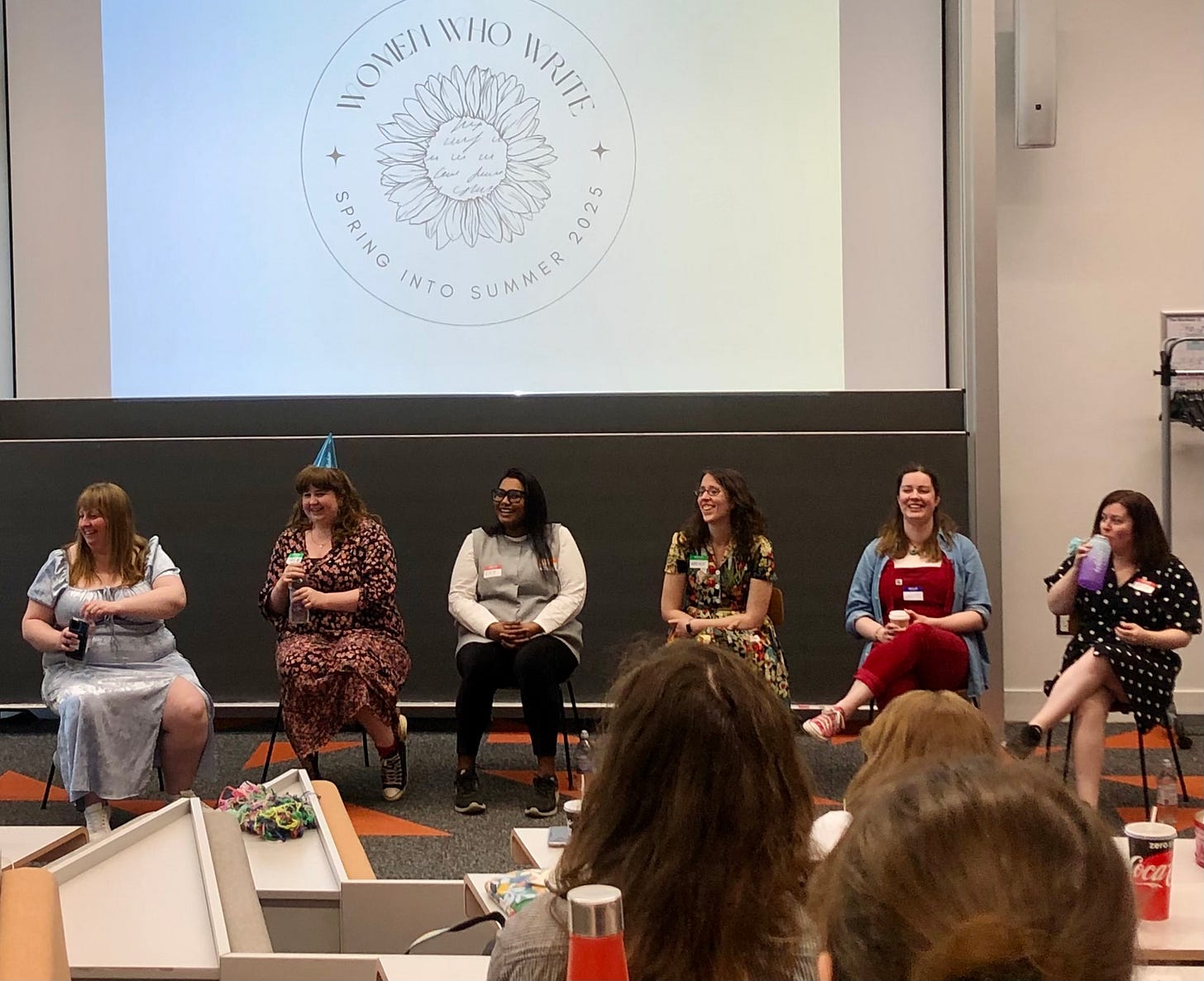50 Days in Writing
Imperfect conditions and some stellar advice for finding the time to write.
For the past 50 days, I’ve been writing with
as part of their Spring into Summer Challenge. Okay, full disclosure: I have not written something on every day of those 50 days. In fact, I actually sat down with my laptop for around half of those, a few where I did some half-heareted journaling in my notebook and there were nearly two weeks in the middle where I wrote nothing at all.But that doesn’t matter. My goal was to write for 30 minutes a day across the 50 days, a total of 1,290 minutes across the challenge. While I didn’t write every day, I still exceeded that total target number of minutes. I didn’t meet my goal in the way that I had originally set out, but I met it nonetheless.
My writing over the last 50 days was perfectly inconsistent, rather than inconsistently perfect, which pretty accurately reflects the kind of month-and-a-half I’ve had. That’s been the biggest change in my approach to creative work-life recently. To be chasing perfection - the perfect sentence, the perfect conditions, the perfect angle, the perfect writing routine - is exhausting and only sets you up for failure. On the rare occasion that perfection happens, luck usually has a big part to play, and we aren’t always lucky. We can revel in the perfect conditions when they present themselves, but do so knowing that they might become elusive for a while after.

To be perfectly inconsistent is more realistic. It’s not about letting yourself off the hook: we all need to do things when we don’t feel like it, even ‘fun’ creative work. Rather it’s about accepting (and embracing) that expecting your creative work-life to be untouchable and perfect in way that the rest of life never is, is stupid. It’s about taking advantage of the time you have, be it 20 minutes or 24 hours, and being gracious with yourself when plans change.
I knew that, in the middle of the challenge, there were five days in a row that I wouldn’t be anywhere near my laptop. So I didn’t set a 30 minute target for those days. In the end, I didn’t write for those five days, but I also didn’t write anything the three days before and after. And it was fine. I’d gone into the challenge knowing from the start that I wouldn’t (couldn’t) write every day. So when there were other days I also couldn’t or didn’t write, it was fine. Rather than chucking the whole challenge in because I hadn’t had the ‘perfect’ writing streak, I was confident that I would write, when I could, because I wanted to and needed to. So I kept going.
Taking part in a writing challenge, writing as part of a community with different degrees of accountability and plenty of opportunities to write in person, are big motivators. I’m making peace with my need for external motivation (and validation lol) so a challenge where you can share your progress with the group and see how others are getting on, is the kind of gentle pressure that I need.
The Women Who Write Edinburgh team are so encouraging, so active and give writers so many opportunities to be visible to each other, to see that we’re part of someting bigger than our solo selves typing away at our desks (or elsewhere).
This challenge culminated in a panel event called Rage About The Page, chaired by author and WWWE organiser Abbie Gibbs, about the barriers and challenges that women and non-binary writers face today in publishing, writing and creative careers.

The discussion with the writers on the panel was wide-ranging. It touched on issues like the need for publishers to be more flexible and open-minded about who and how they publish, the state of the funding landscape, the impact of class and social barriers, and the massive amount of unpaid labour done by women in the writing and publishing sector, including in grassroots creative community organising like WWWEd. Sounds heavy, and it is serious, but there was also plenty of joy and positive, practical advice from the panel.
A central theme of the challenge was giving yourself time to write, in whatever way that felt right. Even in community, that can be hard. During the panel Q&A, a question was asked about finding the time for creative work around a full-time job, a relationship, family responsibilities, laundry, feeding yourself, paying your bills…without running yourself into the ground. The panel gave such generous and helpful advice, a lot of which I scribbled down and want to share here. Some of this you might have heard before, some of it might be new, but it all bears repeating.
How To Find Time To Write
Carry a rubbish notebook with you
Writer and editor
’s advice is to always carry a notebook with you - specifically a ‘rubbish’ one that you can write everything and anything in, without being precious. Chuck it in your bag, get coffee on it, cross stuff out and write in the margins, it doesn’t matter. Just make sure you have it on hand so you can write, whenever and wherever you are.Set yourself small goals
Small goals and structure are key to finding time to write, says Nadine Brito, chair of Forest Publications. 10 minutes are more than no minutes, and can quickly build to 20, 30 minutes a day. Everyone can find 10 minutes - on the bus to work, while you’re eating breakfast, just before bed - so find yours and stick to it.
Prioritise your writing
Really, its not about finding time. It’s about making time. As author Lily X advises, if writing is a priority for you, then treat it like a priority. That’s difficult in a culture that says you must prioritise immediate financial and social reward, but making your creative work important isn’t about quitting your day job or never speaking to your friends again. It’s about having the confidence to say this work is important to me, so I’m going to do that instead of something else. Even just for 10 minutes.
Use your network
I also really liked what Lily said about using your network. Who do you trust to support your creative work and why don’t you ask them for help? Help and support will look different for different people. Can you ask your partner or flatmate to take on some of your household chores this week and use that hour or so to write? Maybe you’ve got a friend of a friend who knows about funding who could help you apply for a grant. Would your boss support your application for flexible working hours? No doubt you would offer support to someone else, so the chances are they would do the same for you if you asked.
Let things fray a little
“Sometimes, I let my life fall apart a bit - but it’s okay because I always pick it back up,” says Lexie Angelo, writer, founder and editor at Radical Books. Her advice to “let things fray a little” - leave the dishes in the sink, miss birthday drinks, not do the laundry, reply to that email later - is the key to finding time to write. (There’s that theme of prioritising again, as well as making the most of small windows of time.)
Show yourself some love
What would you say to someone else who wanted to make time to write? Writer Naomi Head, who runs and curates the excellent The Good Egg Project and newsletter, turned the question back on us. The answer was, of course, tell them to take it. Naomi’s advice is to show yourself the same love that you would show someone else. Give yourself the time because you deserve it, you are worthy of it, whether you’re writing a novel or finding space to journal. In short, take yourself seriously.
A big thank you to the brilliant panellists for sharing their advice and experience, and thank you to Women Who Write Edinburgh for organising such a great challenge and closing event.
Here’s this week’s round-up of reading, listening and watching that’s piqued my interest:
Rage About The Page panellist Ruby is also on Substack! This week she shared a great piece about class and children’s publishing, about who gets to decide what stories are told and how. She’s also included an excellent resource list if you want to read more about the topic.
Farrah Storr’s tips for traveling to a new city have got me daydreaming about future holidays.
There are a few women I would like to be when I grow up and writer Lauren Elkin is one of them. Here she is being interviewed on the In Haste podcast about literature in translation - très chic.
Not so chic: as someone who routinely ends up with coffee dribbled down my front or splashed with sauce while cooking spaghetti, I enjoyed
’s take on the real drama from this year’s Met Gala.At time of writing this, I haven’t actually listened to it yet but as a Danny Dyer fan, you bet I was excited when I saw he was the guest on this week’s Desert Island Discs. Fun fact: Danny Dyer is a descendant of Thomas Cromwell, which is maybe my favourite intersection of my interests.





Thank you for the shoutout! Sloppy queens unite xx
One of the best things I ever did was buy a cheap/inexpensive folding Bluetooth keyboard, so I could write on my iPhone with Google docs. Because the endless array of notebooks I'd take with me would remain blank. Entire Substack posts have been written over a take-myself-out-to-dinner date with that $40 wonder. Highly recommend. Congrats on exceeding your goal, Rebecca, imperfectly (the best way). It's not about the consistency. It's about the enjoyment. xo